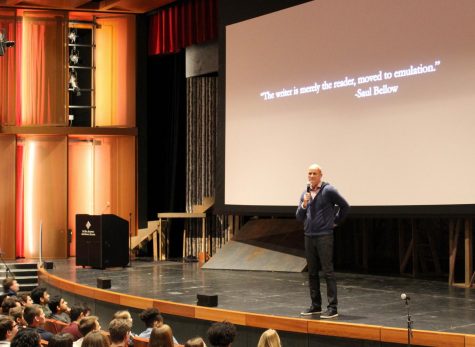Keynote speaker Michael Bazzett takes the stage for Book Fest
Every year, the English department searches vigorously to find a speaker for the first day of Book Fest in order to captivate students’ attention. This year was no exception, as poet and author Michael Bazzett took the stage, talking about everything from Rochester, his hometown, to a 3rd grader who was exceptionally good at poetry.
“The great thing about poetry is that the materials are readily available to you. Words are absolutely free. They belong to everyone. The oldest modes of storytelling are really musical. You know how long we’ve been writing stuff down? Five to six thousand years. Do you know how long we’ve been telling stories? A couple hundred thousand years,” Bazzett said.

Michael Bazzett explains the basics of poetry, which in his mind is one of the most powerful forms of writing.
In demonstrating how ingrained literature is into every human, Bazzett did a little experiment. “So now I’m going to see if you remember some poems,” Bazzett said, addressing the audience. “I will not eat green eggs and ham, I will not eat them…”, “…Sam I am,” responded the audience. “I will not eat them with a fox, I will not eat them…”, “…in a box,” responded the audience once more. “This is what mark literature leaves. When was the last time you read that book?”
Bazzett went on to dissect the poem of a third grader, written in crayon and projected up onto the screen. When the poem ended up sounding remarkably more profound than one would expect of a writer from grade school, Bazzett explained why. Extracting a single word from a line of the poem, Bazzett remarked, “Do you think she knew the etymology of the word ‘infinite’? No, of course not. Do you think she knew that the word ‘fin’ is Latin for limit or end? That the implication of what she wrote was that she was not going to be limited by how you define her?” The audience murmurs “no”. “Exactly,” Bazzet said, “but does the poem know it? Yes. That’s the great thing about words. When you press on them they start to open up like that.”
Before his time was up, Bazzett imparted several messages onto the audience. “Poems can turn the world upside-down,” Bazzett said. “Dig deeper. There’s always more to something than what you can tell by its surface.”
Kelby Wittenberg is the Rubicon News co-editor at RubicOnline. This is his fourth year on staff. He enjoys RubicOnline because he believes news is the...
Michael Bazzett • Nov 14, 2017 at 6:19 pm
Thanks so much for having me, S.P.A.! You were a lovely, lively audience and the pleasure was all mine!